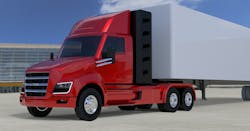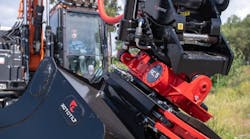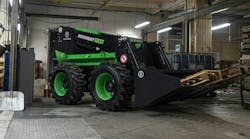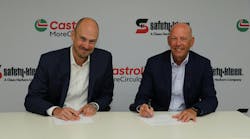Nikola Motor Co. unveiled its long-awaited fuel cell-electric, sleeper-cab tractor Thursday night to an enthusiastic audience in Salt Lake City, announced that Ryder System will sell and service it, and stated that a daycab version will expand its benefits to applications closer to construction. Nikola One, the streamlined tractor, and Nikola Two, the daycab, promise high performance and fuel economy with low maintenance and zero emissions.
Prompted by the company’s founder and CEO, Trevor Milton, a form-fitting white wrap was pulled off the streamlined Nikola One amid applause, cheers and whistles from hundreds of guests who think it might really be the game changer for the trucking industry that Milton claims.
Nikola Motor’s engineers are designing the electrically propelled truck and preparing it for production, which is supposed to come by 2020. Development has been difficult, Milton said, “but one of my favorite quotes is, ‘The electric light did not come from continuous improvement of candles.’” His small company could take the chances that a large corporation simply cannot do, he said.
Nikolas will be sold and serviced by Ryder System, and Ryder’s expertise and more than 800 locations will provide complete support for the trucks, Milton said.
Without an engine, transmission, driveline and axles, it will be cheap to maintain and will get double the effective fuel economy of today’s diesel-powered trucks and tractors, he said. Because propulsion is electric, it will emit no emissions other than water vapor produced by the chemical reaction of converting hydrogen, its fuel, to electricity.
Milton said the sleeper-cab tractor will go 1,200 miles between fill-ups of liquefied hydrogen dispensed at a network of 364 stations that Nikola will build and operate throughout the United States. Fuel will be supplied at no charge for a truck’s first 1 million miles, its cost built into the purchase or leasing agreement that each customer will sign.
So intriguing is the concept that many of those in the audience had put down $1,500 apiece to reserve one or more of the trucks. Nikola has raised about $4 billion from the orders alone, Milton said.
Customers for the Nikola One include U.S. Xpress, the giant freight hauler in Chattanooga, Tenn., whose CEO, Max Fuller, has been an advisor. His fleet’s name is emblazoned on the Nikola One prototype.
“I’ve come up here five or six times to talk with them, making suggestions” on how the truck should be designed for what it must do, Fuller told Construction Equipment.
The promised economics of Nikola One are impressive, but “it must hold up,” said Jay England, CEO of Utah-based Pride Inc. “It’s got to be durable and reliable.” Whether or not it is, will be discovered through real-life operations.
That’s why KTI Ltd., a much smaller fleet in Pulaski, Va., ordered just a single Nikola One, said Joshua King, the company’s president. “We’ll start with that and see.” He ordered it because he thinks it will appeal to drivers, “and the driver shortage is a big concern to us now. They’ll like it for the comfort, and the power, and the quietness.”
A fully independent suspension supplied by Meritor will smooth the ride, Milton said in his presentation, and the silent hydrogen fuel cell and electric motors will contribute to quietness. Together the six motors, one at each wheel, will make up to 1,000 horsepower and 2,000 lb-ft. of torque, enough for impressive acceleration and to move an 80,000-pound rig up a 6% grade at 65 mph.
All-wheel drive suggests effective traction that might be usable for on/off-road vehicles, like dump trucks and concrete mixers, for the daycab Nikola Two. But Milton didn’t discuss that.
The fuel cell produces electricity that’s sent to bank of advanced lithium-ion batteries, from where it’s sent to the motors. Batteries are mounted between frame rails for a low center of gravity and high stability. Wheel-by-wheel torque vectoring helps for traction and in cornering. Regenerative braking sends more electric energy to the batteries, and does 85% of the stopping a rig requires, and air disc brakes take care of the rest.
The first 5,000 units will be produced by Fitzgerald Gliders in east Tennessee. Meanwhile, Nikola will build a plant with a capacity of 50,000 trucks a year, and it will use many robotic operations to minimize assembly errors. Milton and his colleagues are discussing possibilities with several states and will announce a site choice in mid 2017.
Because the fuel cell-electric hybrids are so different than traditional diesel-powered trucks with their complex mechanical drivetrains, Milton knows that many people may be skeptical, and might not believe they really will be built. So he declared, “This truck will come to market. I can guarantee that.”





